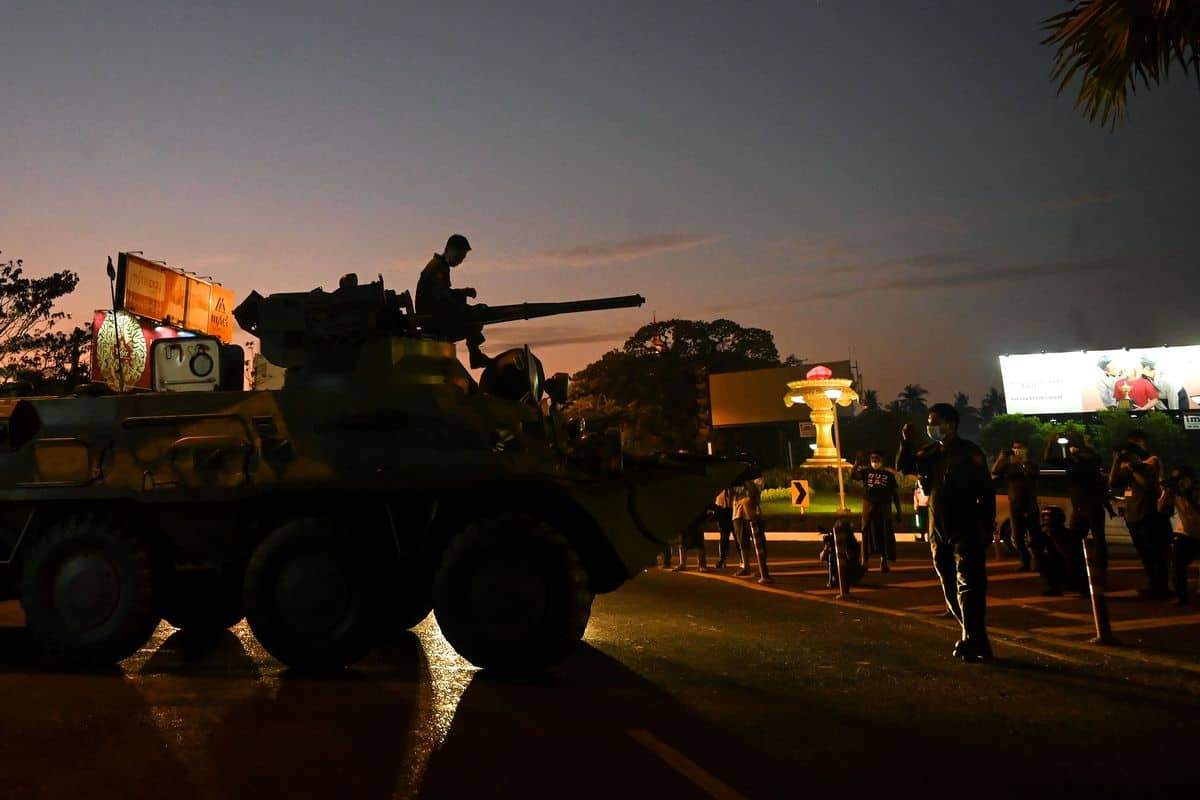Myanmar Junta Tightens Control, Orders New Internet Blackout

(Bloomberg) -- Myanmar’s junta strengthened its grip on power over the weekend, ordering an internet blackout overnight and making it easier for authorities to make arrests as it looks to quell surging protests against its Feb. 1 coup.
Protests continued on Monday after tens of thousands of people continued to demonstrate in defiance of the military even as the regime stepped up detentions of civil servants, lawyers and other professionals. Telecom services were told to cut all internet between 1 a.m. and 9 a.m. on Monday, and armored vehicles were seen rolling through the streets of central Yangon on Sunday night.
In a joint statement on Sunday, ambassadors from the U.S., U.K., Canada and the European Union called on the military to avoid violence while condemning the arrests of dissidents as well as the disruption in communications. Real-time network data showed national connectivity fell to just 14% of ordinary levels following the blackout order, according to London-based internet monitor NetBlocks. Internet services have since been restored allowing live footage of fresh protests to emerge on social media.
“We support the people of Myanmar in their quest for democracy, freedom, peace, and prosperity,” the ambassadors wrote. “The world is watching.”
Myanmar army chief Min Aung Hlaing has struggled to gain control of the streets since ousting the civilian government led by Aung San Suu Kyi, whose party won a landslide victory in November elections. She has urged the country’s 55 million people to oppose the army’s move, calling it “an attempt to bring the nation back under the military dictatorship.”
In a brewing showdown with protesters on Monday afternoon, dozens of police officers barricaded access to the National League for Democracy’s headquarters in Yangon as demonstrators quickly assembled in the area. Ba Myo Thein, a lawmaker with the party who is trapped inside the building with 15 others, said the authorities are trying to gain entry again following a first raid days ago.
“We didn’t do anything wrong, but they dare to do such an illegal act even in the daytime,” he said, adding those inside have turned away the police. “It is totally unacceptable.”
Suu Kyi and other political leaders are among 400 people detained since the coup, a number that keeps rising by the day. While authorities have largely avoided confronting protesters in major cities like Yangon who have ignored a ban on public gatherings, several demonstrators have been injured in crackdowns -- including a woman shot in the head who is now on life support in Naypyidaw, the capital.
Suu Kyi will remain in detention ahead of a Wednesday court hearing, Reuters reported citing her lawyer.
A spokesperson for UN Secretary General Antonio Guterres wrote in a statement on Sunday that he was “deeply concerned” about the situation, “including the increasing use of force and the reported deployment of additional armored vehicles to major cities.”
Min Aung Hlaing over the weekend amended a privacy law to suspend provisions that prevented authorities from taking actions like conducting searches without a warrant, detaining suspects for more than 24 hours without court approval or intercepting electronic communications. The amendments will remain in effect only during the reign of the State Administration Council, the body formed to govern Myanmar during a yearlong state of emergency.
The military also warned the media against referring to their power seizure as a “coup,” saying the state of emergency was declared in line with provisions of the 2008 constitution drafted under a previous junta. Last week, the junta proposed a cyber security law that could see social media users fined or jailed for posts containing what it construes as “misinformation or disinformation that causes public panic.”
The junta late Saturday issued arrest warrants for seven activists including 1988 uprising leader Min Ko Naing and members of Suu Kyi’s National League for Democracy party. Activists said the amendments on Saturday are a sign of tougher crackdowns to come.
“Anyone can be arrested anytime,” said Maung Saung Kha, executive director of Athan, a Yangon-based freedom of expression advocacy group. “No one feels safe at this point.”
The Biden administration was quick to denounce the coup and implement sanctions against its leaders. Global companies including Japanese beer maker Kirin Holdings Co. have dialed back investment plans in the country since the military takeover.
“The Tatmadaw’s strategy not only threatens to further inflame social unrest and elevate stability risks, but a crackdown on civil servants could also undermine policy delivery,” said Peter Mumford, Southeast & South Asia practice head at risk consultancy Eurasia Group.
Photo and Link: https://www.bloombergquint.com/politics/myanmar-junta-amends-law-for-more-power-on-detentions-spying











